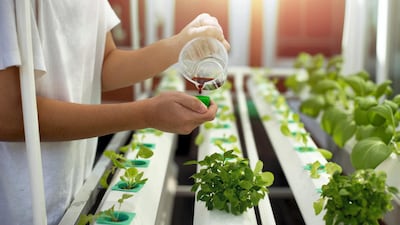Although the world produces enough food to feed humanity’s population of 7.6 billion, more than 3 billion people cannot afford to maintain a healthy diet, according to a report by the Food and Agriculture Organisation, a UN agency.
Although ending hunger by 2030 was a hallmark of the UN Sustainable Development Goals, both hunger and malnutrition remain among the greatest challenges facing our species.
As the FAO report finds, we are not on track to achieve zero hunger in the next decade, and we are behind in several other nutrition-related indicators.
The Covid-19 pandemic, which has weakened economies and threatened international supply chains, has only hindered global progress further.
Measures to contain the disease have limited labour mobility and made access to nutritious food among the most vulnerable more difficult.
As Mariam Al Mheiri, the UAE Minister of State for Food Security, explained at a recent roundtable discussion, the pandemic has also increased awareness among policymakers and the public of the importance of nutrition in maintaining immune systems and combatting disease.
At its heart, food security has to be nutrition security; both are matters of public health.
They are particularly acute here in the Middle East, which once had a place in human history as the world’s breadbasket.
In the past century, the arid climate, economic underdevelopment and geopolitical instability that characterise large swathes of the region have left millions of its citizens food-insecure.
According to the World Food Programme, 20 million Yemenis are food-insecure. The country also suffers one of the highest rates of child malnutrition. In Syria, fuel and wheat shortages have created a hunger crisis.
As with other problems of global magnitude, there will not be one solution, but many. Technology, for instance, will be a critical tool in humanity’s arsenal.
This explains the rise of the agricultural technology (AgriTech) sector in recent years. The UAE has made AgriTech investment a priority.
Even before the pandemic, the UAE was invested in enhancing its food security, growing its own vegetables – whether on vertical farms or by harnessing the potential of aquaculture.
To this end, the country has seen impressive results in its use of technology to source locally.
The progress is evident, as is the diversity of projects and different models of farming that are under way across the Emirates.
During the height of the Covid19 pandemic, food shortages were felt in many parts of the globe, but not in the UAE, thanks to measures taken as part of the National Food Security Strategy.
Beyond large-scale public investment, efforts to boost entrepreneurial solutions to food security issues are also critical.
This week, four start-ups, all of which are making great strides in growing or helping grow food sustainably, were awarded a share of a $1m prize at the country's FoodTech challenge to develop advanced solutions in the UAE.
The initiatives on display range from equipping fishing nets with lights to the use of saltwater for irrigation to grow food.
Technology, in the end, will not solve everything. A society-wide resolve to adhere to public health advice and promote healthy, locally sourced food will be integral to long-term solutions.
Regional co-operation across governments and civil society will also be critical.
The march to end hunger in the Middle East will be long, but with a renewed commitment to addressing the challenge at every level, the region can become a global breadbasket once again.


